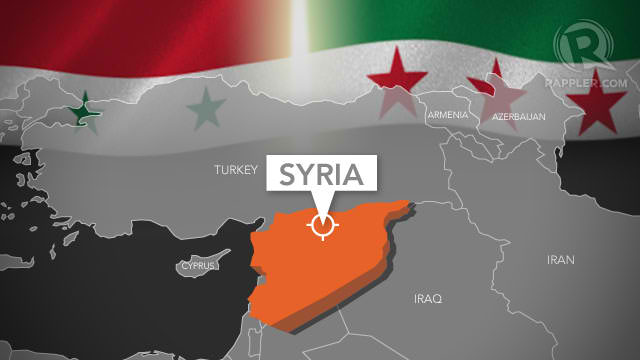SUMMARY
This is AI generated summarization, which may have errors. For context, always refer to the full article.

DAMASCUS, Syria (UPDATED) – Syria has handed over complete data on its chemical arsenal to the world’s watchdog, meeting a Saturday, September 21 deadline to avert military strikes, as regime aircraft pounded targets across the country.
The Hague-based Organisation for the Prohibition of Chemical Weapons said it was examining the Syrian information that was the focus of a US-Russian deal to head off US strikes against Syria.
The disclosure came as a senior Kremlin official said Russia may change its position on ally Syria if it sees any “cheating” by the regime.
Kremlin chief of staff Sergei Ivanov did not clarify, in comments reported by Russian news agencies, but added he expected Syria’s chemical arsenal to be disclosed within a week.
UN envoys, meanwhile, have struggled to agree on the wording of a resolution to enshrine the deal, which stipulates that Syria’s chemical arsenal must be destroyed by mid-2014.
The “OPCW has confirmed that it has received the expected disclosure from the Syrian government regarding its chemical weapons program,” it said on Saturday.
“The Technical Secretariat is currently reviewing the information received.”
On Friday, September 20, the OPCW said it had received initial data from Syria and was expecting more.
The US-Russian agreement, worked out after Washington threatened military action in response to an August 21 chemical weapons attack outside Damascus, requires Syria to hand over its entire chemical arsenal.
It has received widespread international support, including from China, whose Foreign Minister Wang Yi said Beijing would “support the early launch of the process to destroy Syria’s chemical weapons”.
Ivanov cautioned on Saturday that the process could be complicated because the Syrian army does not control the entire country.
“We still don’t know where the chemical weapons are located geographically. I think this will become clear within a week,” he told a conference in Stockholm.
Russia is a key backer of Syria and one of the five permanent members of the UN Security Council, along with Britain, China, France and the United States.
Since Monday the panel has wrangled over the wording of a resolution to back the destruction of Syria’s chemical arsenal.
Washington, Paris and London want a strongly worded resolution, possibly under the UN Charter’s Chapter VII, which could allow the use of force or sanctions to ensure compliance — a move Moscow opposes.
Regime warplanes in action
US Secretary of State John Kerry said he and his Russian counterpart Sergei Lavrov spoke by phone Friday about a “strong” UN Security Council resolution on the deal.
The chemical weapons disarmament deal has done little to slow fighting on the ground.
On Saturday, regime aircraft attacked targets nationwide, including in the provinces of Damascus, Aleppo and Hama, the Syrian Observatory for Human Rights reported.
The watchdog, which relies on reports from activists and medics on the ground, also reported that troops, backed by Alawite pro-regime militias, killed 15 people in the Sunni village of Sheikh Hadid in Hama province late on Friday.
It said the army and militiamen also retook from rebels two nearby villages, while state news agency SANA reported the recapture of three villages including Sheikh Hadid.
Syrian President Bashar al-Assad belongs to the Alawite religious minority while rebels fighting to oust him are mostly Sunnis.
The Observatory also said rival rebel groups exchanged prisoners under the terms of a deal to end fighting over the town of Azaz near the border with Turkey.
The truce between the mainstream Free Syrian Army and the Al-Qaeda-affiliated Islamic State of Iraq and the Levant (ISIS) was brokered by a third brigade.
Tensions have spiraled between some mainstream rebel groups and ISIS in recent months, especially in northern Syria, where the opposition controls vast swathes of territory.
The Syrian opposition National Coalition, meanwhile, rejected an offer from Iranian President Hassan Rowhani for Tehran to mediate between rebels and the regime.
“The Iranian initiative is not serious and lacks political credibility,” the key opposition grouping said in a statement, pointing to Tehran’s close ties to Assad’s government.
French President Francois Hollande is to meet Rowhani on the sidelines of the UN General Assembly next week for talks on Syria and Iran’s nuclear program.
“What we want to see is an Iran fully engaged, like other players, in the search for a real political transition in Syria,” an aide to Hollande said.
Rowhani, a moderate on Iran’s political scene, has made several diplomatic overtures since his election in June, and there has been speculation that he could also meet US President Barack Obama at the United Nations next week. – Rappler.com
Add a comment
How does this make you feel?
There are no comments yet. Add your comment to start the conversation.